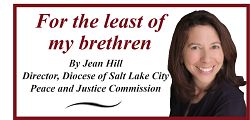Independence Day's Secular Ideals Reflect Catholic Teaching
“We hold these truths to be self-evident, that all men are created equal, that they are endowed by their Creator with certain unalienable Rights, that among these are Life, Liberty and the pursuit of Happiness. That to secure these rights, Governments are instituted among Men, deriving their just powers from the consent of the governed.”
The ideals of the Declaration of Independence still speak loudly, and we should celebrate the sacrifices made by so many to create a new nation. The question is whether we, as Catholics and as a nation, are also capable of acknowledging the limitations of the men who signed it and the need for continued sacrifice today.
Can we admit, for a start, that Thomas Jefferson’s inspiring preamble encompassed only white men? That the unalienable rights of life, liberty and the pursuit of happiness he cited were regularly and blatantly denied to thousands of men, women and children chained in slavery? Can we face these realities without losing our appreciation for the work that Jefferson and his compatriots did to create the nation? Can we accept that the Founding Fathers were flawed men who denied the very humanity of the Black slaves who built their economic prosperity? Or are we only capable of celebrating our independence if we can maintain a myth that the men who brought it to life were superhuman?
Catholics, at least, should be able to admit the founders of the United States of America made grave errors. We fully recognize our flawed nature and celebrate the truth that God sent his son to save us because he loves us anyway. We surely can, and must, admit that the Founding Fathers accomplished an incredible feat in creating this great country, even as they established government, economic and social structures steeped in the falsehood that Black men and women were somehow an inferior image of God.
We must also recognize that the Declaration of Independence required that men and women sacrifice their lives, liberty and pursuit of happiness for the common good. The men who fought for our independence would have failed if each decided to protect his own individual rights at the expense of all others. Without their combined willingness to commit treason against the British government and fight together against its armies, the revolution would have had a much different outcome.
As a church, we teach that the common good “requires the constant ability and effort to seek the good of others as though it were one’s own good...” The demands of the common good “concern above all the commitment to peace, the organization of the State’s powers, a sound juridical system, the protection of the environment, and the provision of essential services to all, some of which are at the same time human rights: food, housing, work, education and access to culture, transportation, basic health care, the freedom of communication and expression, and the protection of religious freedom. Nor must one forget the contribution that every nation is required in duty to make towards a true worldwide cooperation for the common good of the whole of humanity and for future generations also. … ” (Compendium of the Social Doctrine of the Church.)
Given these responsibilities, we should not allow Independence Day to devolve into a celebration of selfishness, setting off fireworks despite the risk of starting a fire, or demanding “my liberty” at the expense of a neighbor’s. It should be a day we come together as one nation, under God, to promote liberty and justice for all. These secular ideals reflect the Catholic teaching that we are each created in the image and likeness of God, not put on this earth for our own amusement, but to build a world that reflects God’s commandment to love one another as ourselves.
I wish everyone a happy Independence Day and hope each of us will spend it reflecting on the many sacrifices made to create the United States, the ways in which we can perfect the inequalities and imperfections still within the structures they created, and our ongoing Baptismal call to build a nation of justice and peace.
Jean Hill is director of the Diocese of Salt Lake City’s Office of Life, Justice and Peace. Contact her at jean.hill@dioslc.org.
© Copyright 2025 The Diocese of Salt Lake City. All rights reserved.


Stay Connected With Us